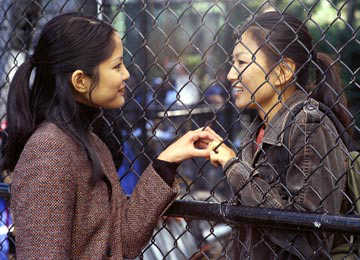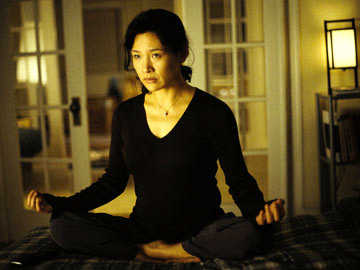

A few months ago, a film called Face arrived in theaters. It was about the generational and cultural gap between mothers and daughters, specifically for Chinese women. Saving Face is along those same lines (as well as other movies like Double Happiness, The Joy Luck Club, and maybe the awful Close Call), but is much better thanks to some understated acting and a warm script. Again, to understand these movies it is important to understand Asian culture, rooted in concepts like Confucianism. Respect for one's elders is paramount. All the decisions that somebody makes will reflect on that person's mother or father. Any bad decision will bring shame upon the family in the eyes of their friends and acquaintances. Children are expected to get certain kinds of jobs over others because they are respected or require skill, not because it is what that child wants to do. This clashes with many Western traditions of individualism, and makes for great drama amongst Asian children of immigrants.
For Wil Pang (Michelle Krusiec, Cursed, Duplex), 'face' is the overriding concept in her life. She is caught between the expectations of her mother (Joan Chen, Avatar, What's Cooking?) and the desires of her own life. She beginning a career as a successful surgeon, but that is not enough. Her mother expects her to be married, and constantly tries to set her up with a parade of young Chinese men. The problem is, she's gay, and hides it from her mother. This becomes harder to do once she begins seeing Vivian (Lynn Chen), and when her mother moves in with her. Ma (that's how she's credited in the film) is having her own problems. She is pregnant, but refuses to disclose the father (Wil's father died a long time ago). This is particularly bad for Ma's parents (Wang Jin, Pavilion of Women, and Koh Guang Lan), as it brings shame upon them.
Krusiec's performance is the anchor for Saving Face. She's been around in films for a while, but typically in smaller roles. Judging from her performance here, she is certainly up to a leading role. Krusiec's Wil is caught between two worlds, resulting in a hesitant, guarded personality. She wants to please her parents and grandparents, but also wants to be her own person. Trying to balance the two is slowly taking a toll on her, worsened once she meets Vivian. She loves Vivian, but is very reluctant to tell her family because she knows they will disapprove. Wil tries to take the middle ground, which is insulting to Vivian. After all, how can Wil claim to love somebody and then hide it from her family? Krusiec generates a lot of empathy for Wil, who seems completely at a loss as to what to do. And her reactions of abject embarrassment at Ma's actions during many of the lighter moments in the film are priceless. The Vivian character also balances her desire to do modern dance against the expectations of her to perform ballet. Chen (Lynn) gives a strong, assured performance as Vivian, who knows what she wants and becomes disillusioned at Wil's indecision, and Chen's (Joan) Ma feels more like a child sometimes than the mother. Rounding out the cast is a nice performance by Luoyong Wang (Smile, Lana's Rain) as Wil's boss, and Jay (Ato Essandoh, Garden State, Roger Dodger) as Wil's neighbor.
Writer/director Alice Wu does a good job of balancing the emotions from drama to many light touches of comedy, effectively capturing the Asian American experience. It's small things like having Ma speak to Wil in Mandarin and Wil respond in English, that make the film seem more realistic. Where Face had lots of yelling, the characters in Saving Face are quieter, and a bit more realistic. Wu structures the film such that Ma's struggle with her parents is the same as Wil's struggle with Ma. Nevertheless, underlying the entire familial relationship is a sense of love for each other. Ma, Wil, and Wil's grandparents all love each other, but are unsure sometimes on how to express it. Wu avoids stereotyping the main characters, and lightly pokes fun at some of the supporting ones. Wil, Vivian, and some of their friends are not the typical uber-nerds or over-sexed Asians seen in films. They are normal people who happen to be Asian, or gay for that matter. All of this results in a two-fold success for Wu, a good story about intergenerational issues as well as one about a girl coming to terms with her sexuality.